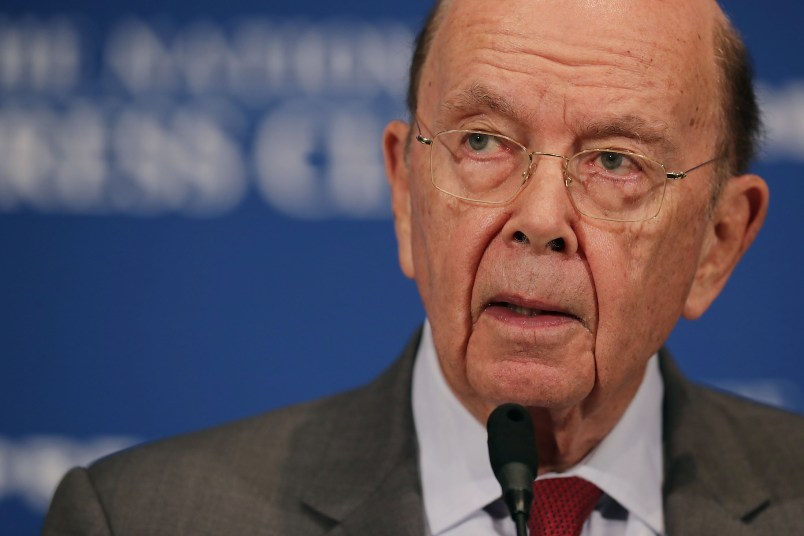Commerce Secretary Wilbur Ross is in front of the House Oversight Committee Thursday, where he will be grilled about his decision last year to add a citizenship question to the 2020 Census.
His previous explanations to Congress and to the public — where he claimed that the Department of Justice initiated a December 2017 request for the question for voting rights enforcement purposes — have been undercut by documents released in the litigation over the question.
Ross, in fact, was hankering for the question from the beginning of the Trump administration, the documents show.
On Thursday, Ross told the committee that, sometime before he announced the move in March 2018, “we understood that the Department of Justice might want a citizenship question reinstated on the decennial census.
“I instructed staff to follow up with DOJ for a written statement confirming whether or not DOJ was going to ask for reinstatement of the question,” he told the committee, according to the prepared remarks.
His remarks defended his decision, which will be reviewed by the Supreme Court.
Read Ross’ prepared remarks below:
Good morning Chairman Cummings, Ranking Member Jordan, and members of the Committee. Thank you for inviting me to testify.
I also thank the Chairman for limiting this hearing scope so my staff can produce documents beyond the approximately 8,700 already provided. And I appreciate your agreement that I can submit written answers to questions about my personal finances after the hearing.
Many of you have questions about the 2020 decennial census, and I welcome the opportunity to discuss that topic today.
Let me be clear at the outset, the Department of Commerce is fully committed to administering as complete and accurate a decennial census as we can. We intend to try to count every person and are taking all necessary actions to do so.
When I assumed office in 2017, I immediately began a deep dive into oversight of the decennial census. There was significant work to do preparing for the hiring and training of more than 450,000 part-time temporary census workers. Working with outside experts, we concluded that the prior Administration underestimated the budget by $3.2 billion, about 25%. OMB and Congress accepted our finding.
We are also making far greater use of administrative records than ever before, especially for one of the most severely undercounted segments, children. We have a half-billion-dollar advertising campaign to reach hard-to-count communities. And on the 2020 decennial census, people will now be able to respond in 12 non-English languages, 5 more than in 2010.
We started our community partnership program a year earlier than last time. There are already more than 1,500 state, tribal, and local governments helping us – double what we had in 2010. And we will do our best to collect more complete data.
On March 26, 2018, I decided to re-instate a citizenship question on the 2020 decennial census pursuant to the statutory authority given to me by Congress. My reasoning is explained in my March 26, 2018 decision memo. It is available on the Department of Commerce web site.
Questions about citizenship, or country of birth — or both — were asked as part on all but one U.S. decennial census for 180 years, from 1820 to the year 2000. Indeed, the citizenship question continues to be asked every year by the Census Bureau on the American Community Survey, or ACS for short. It is a sample survey distributed annually to about 2.64 percent of the American population.
Prior to my March 26 decision, we understood that the Department of Justice might want a citizenship question reinstated on the decennial census. There is no formal process for adding questions to the decennial census. However, other federal agencies had previously submitted written requests for questions to be added to the ACS, and such requests trigger an internal Census Bureau review prior to a final decision.
I instructed staff to follow up with DOJ for a written statement confirming whether or not DOJ was going to ask for reinstatement of the question. I wanted to make sure that we had enough time to adequately consider any formal request that DOJ might make.
Ultimately, on December 12, 2017, DOJ made a formal written request that the Census Bureau reinstate the citizenship question on the decennial census. DOJ sought census block-level citizenship data for use in Voting Rights Act enforcement. In response, the Census Bureau initiated a legal, policy, and programmatic review process to consider alternate means of meeting DOJ’s request.
We held discussions with numerous external stakeholders and elected officials – including Speaker Pelosi and Chairman Cummings, who opposed the idea.
We evaluated thousands of pages of analyses, including written submissions by other members of this Committee.
We submitted our list of decennial census questions to Congress by the March 31, 2018 statutory deadline.
Following receipt of DOJ’s letter, and during our review, Census Bureau officials recognized that current ACS data did not meet DOJ’s request for census block-level data. The Census Bureau analysis also showed that when non-citizens respond to the ACS question on citizenship, they respond incorrectly approximately 30% of the time.
In my March 26 decision memo, I describe more details of the decision-making process and the alternatives we considered to reinstating the citizenship question.As you know, certain aspects of this issue are in litigation before the Supreme Court and other courts. However, I look forward to answering as many of your questions as I can.
Again, I want to be clear that we intend to count as many people as possible. I will be happy to discuss the actions we are taking to do so. Thank you.










